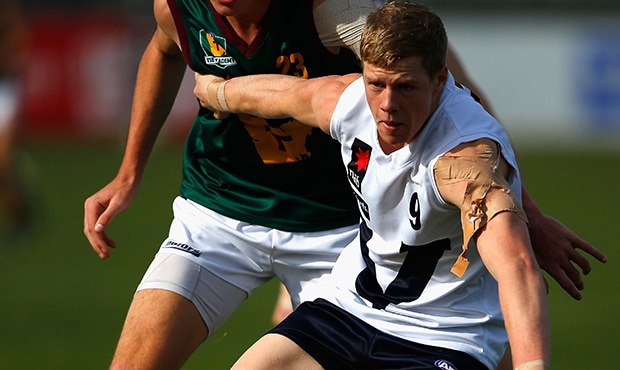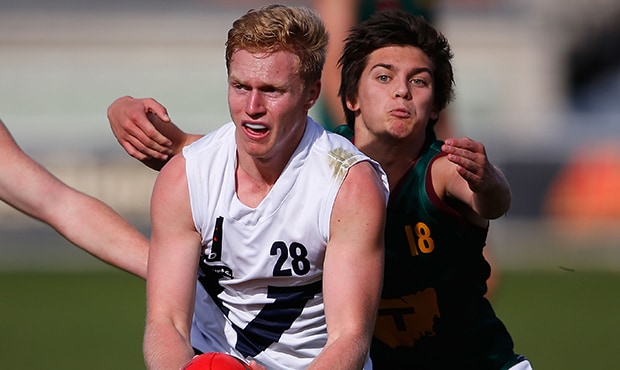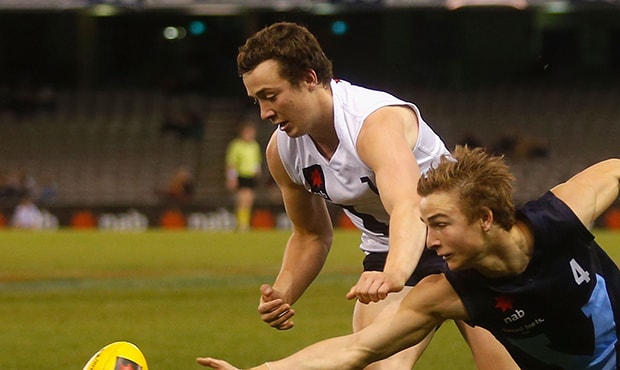He had patches of good form but as many patches that weren't as good, and wasn't drafted at the end of the season.
He finished year 12, and took up a course at the University of Ballarat, where he is studying teaching and living on campus. He recently did a placement at a primary school, looking after the prep and grade one class.
Click here to review the 2013 NAB AFL Under-18 Championships
"I really enjoyed it. It was a bit full on at times. Mood swings, crying, fights, kids going crazy. There was a bit of everything happening," he said.
The move brought him closer to the Rebels, too, where he was listed as a 19-year-old at the club.
He has shifted to half-back and through the midfield, worked on winning his own touches, and was one of four 'over-age' players to be picked for Vic Country through the NAB AFL Under-18 Championships.
He felt more balanced heading into the championships this year. There was less travel, less distraction, more time to improve. It was another chance to impress.
VIC COUNTRY is made up of players from the TAC Cup clubs outside metropolitan Victoria: the Rebels, Geelong Falcons, Murray Bushrangers, Gippsland Power, Bendigo Pioneers. In 2009, the Dandenong Stingrays were also moved into Vic Country classification.
The toughest part of Country's campaign is distance. It means the players only come together to train once on the eve of their five championships matches, and before that, only twice in pre-carnival camps.
In comparison, Vic Metro trained twice a week for three months leading up to, and throughout, the championships. Time is critical for the Country contingent.
At their first camp, in early May, team manager Phil Partington informed the group of two rules.
One: everywhere they went they each needed to carry a water bottle. Two: no phones at breakfast, lunch or dinner. Why? "Because we need to take every minute we can to get to know each other, and become a team," he explained.
Vic Country's first game of the championships was against Northern Territory in Darwin. The coaches, led by Mark Ellis, and state talent manager Leon Harris, picked the squad after the second trial game, against Vic Metro.
There were tough calls, some which caused debate. Has he done enough? Is he better than him? Is he in good enough form?
Every player who was cut was told as soon as the panel had made up its mind, and a follow-up phone call was delivered a few days later.
That first team was without the squad's best eight or so players and draft prospects. It mattered little, however as the Country boys recorded a devastating 111-point win.
For someone like forward Alex Saunders, the game was it was a life experience: born and raised in Bairnsdale, it was the first time he had been interstate.
Zach Merrett was one of Vic Country's best in the win, despite some serious nerves before the game.
"I thought it was going to be as quick as the AFL, but it probably wasn't as bad as I thought it would be," he said.
Merrett was a star cricketer earlier in his youth. He made Vic Country's under-13s and under-15s side, and almost made the Victorian under-17s side, before focusing on footy.
"I love being around the boys a bit more. Cricket, I worried too much about making runs or getting out," he said.
The midfielder grew up hoping to follow in the footsteps of Gary Rohan and Ben Cunnington, fellow Cobden boys who came through the successful Geelong Falcons program.
When he moved to Melbourne Grammar on a scholarship, it was easier to play for the Sandringham Dragons, eliminating the travel factor.
His brother, Jackson, is in his second season at Essendon. He asks Jackson a lot of questions – and doesn't get too many answers – about what it's like to play at AFL level, and how to handle his draft year.
"I watched him play at Visy Park for Vic Country and he looked pretty small out there. I remember him running out and I was thinking, 'That's what I want to do," Merrett said.
He is one of four players in the final Vic Country squad to have family members on AFL lists. Hugh Goddard's cousin Brendon told him to ignore the stuff that hovers around the championships and focus on them like any other game. Matt Crouch's brother Brad told him to be consistent. Zak Jones' brother Nathan didn't tell him much.
"He's given me donuts," Zak said. "He said this year's your main year, you've got to focus and switch on, and I said 'Yep, OK, thanks.' He doesn't want to make my head huge."

Zak Jones up against Tasmania. Picture: AFL Media
It turned out Jones didn't need too much advice (at least from Nathan) – after the championships he was named an All Australian defender. But he did get a lesson from Country defensive coach, and former Carlton full-back, Glenn Manton.
Jones called Manton after the Northern Territory game, having felt he didn't get enough of the ball. Manton's message was simple: "He told me I needed to plug in and plug out, and there's got to be times when you don't worry about it and move on.
"And he also told me he wants me to kick a goal … and do the robot dance for him when I do."
Manton added a different dynamic to the Country coaching panel. It was his first year with the team, and he often started his talks at team meetings with anecdotes and stories that, at first, had no football link.
He drew the players' attention by talking to them differently. One presentation began by talking about KFC burgers, and the production line it involves.
Another started with a comment on the English language. His method worked, though, and the point generally returned to giving effort, playing as a team, and doing everything possible.
Manton gave out his phone number, his email address, and encouraged the players to contact him.
The coaches play a role in teaching the players about expectations, and providing perspective. On a rest day in the middle of the carnival, it's organised for the group to go to Melbourne's Shrine of Remembrance to watch a 21-gun salute.
Straight after, they attend a VFL game.
"Statistics show only a couple of you will be playing regular AFL footy next year," Harris told the group before heading to the game. "A lot will play VFL, so we want you to see what it's like."
On game-day Harris is more hands-off.
Along with Manton, assistants Craig Black (midfield), Cameron Loftus (forwards), and Darren Flanigan (stoppages) controlled the box, and keep Ellis informed of specific areas of the ground. Nathan Harris, Leon's son, managed the whiteboard and monitored the opposition.
Leon Higgins organises the bench and Jamie Hepner is the runner and conditioning coach.
Communication is fast, simple, direct, and open. Inside the box, they all keep tabs on the players in their lines.
Loftus knows that there might be a chance young marking forward Patrick McCartin, a type-one diabetic, will need to come off the ground to check his blood levels, and told the other coaches when that happened.
McCartin, not eligible for the draft until 2014, was diagnosed with the disease when he was eight after he lost almost nine kilograms in three weeks.
He now injects himself with insulin five or six times a day, and is continually checking his levels, including in round two, when Vic Country was far too good for Tasmania to win by 63 points. McCartin kicked two goals.
"The coaches are really easy to talk to and approach. That's something that's made me feel a lot more comfortable telling them about it," he said.
"At the start of the championships there were a few queries from my teammates about what was going on. But they're a great bunch of boys and they've been really supportive as well.
"It's just something to deal with. Everyone has different things they deal with, and this is the same."
THE TEAM reconvened in Melbourne ahead of its round-three trip to Adelaide, to take on South Australia. Vic Country's team wasn't considered the best it has had in recent years, nor a challenger for the 2013 division-one title. It wanted to prove people wrong.
Personal tasks were set. On Wednesday ahead of the South Australia game, Leon Harris called Billy Hartung.
Hartung had a quiet game, for his standards, in round two. Harris had a challenge. "You're on Aish," Harris said over the phone.
Aish was James Aish, South Australia's best midfielder and a likely top-five draft pick. He was in his fourth game back from a shoulder reconstruction, and was beginning to hit form.
"I love getting challenges," Hartung said.
"An area of my game I need to keep working on is my defensive running and having a starting point at a stoppage. There's been too many times in the past where, I admit myself, I've probably been lazy around the stoppages."
Hartung kept Aish to three disposals in the first half, then moved into a more free-wheeling role in the second half, running down the wing, taking bounces and being adventurous.
"I got on my bike a bit more after half-time," Hartung said.
South Australia was too good, though, and won by 34 points. Before the game Ellis spoke to the group about winning respect, about having none, and deserving more. They were well-beaten but had a go, and had some bad luck.
Darcy Gardiner won his battle with goalkicking forward Darcy Hourigan before jumping for a spoil, rolling his ankle and sitting out the rest of the game.
"As soon as I did it I knew it was something pretty bad because it was swollen straight away," he said.
Goddard, a hard-working key position player, started forward and finished with his arm in a sling with a shoulder injury. Before that he was matched up by SA defender Matt Scharenberg, an experience in many ways.
"All the footy I play from now I'll be able to look back on my time and see what I've learned," he said.
"Against South Australia I learned the most. A split second and he was gone. He's definitely got me in pace, so I had to be alert all the time.
"He got away from me at one point and then I really got angry at myself and was like, 'Come on, mate, you've got to be better than that. Start in front.'"
Goddard boards at Melbourne Grammar but plays footy for the Geelong Falcons. He is driven down the highway every Tuesday for training at Geelong.
His Melbourne Grammar schoolmate, Nathan Drummond, was also injured against South Australia. He rolled an ankle early in the game and struggled through the rest of it.

Nathan Drummond set to be tackled while playing Tasmania. Picture: AFL Media
Drummond moved from Shepparton to Melbourne Grammar in 2010. He gradually got over being away from home, and the things he might have taken for granted before.
"Being more independent, doing your own washing. All that stuff your mum does for you," he said.
But just because he was away from his family it is always close in his mind. He has a fascinating family history.
His great, great grandfather, William Cooper, was an activist for Australia's indigenous people. Then, during World War II, he protested and rallied and did what he could to support the Jewish community.
"He stood up for his own people and the Jewish people. It's getting recognised now a bit more than what it was then. He's got a forest in Jerusalem named after him. The family's very proud," Drummond said.
LEWIS Taylor, the undisputed star of Vic Country's 2013 team, was announced captain of the side to take on Western Australia at Simonds Stadium.
In the pre-game team meeting, James Tsitas told the group the players had decided to vote in Taylor as captain because he lifts the side, was excellent against Tasmania, and led by example. Ellis agreed.
"That is a mark of respect but let's be all in it together," he said.

Lewis Taylor fights for the ball against Vic Metro at Etihad Stadium. Picture: AFL Media
Taylor's appointment had significance. He missed round three with suspension after striking a Tasmanian player in round two, so Country was without its best player in the game away from Victoria.
Ellis didn't mind the fact Taylor had gone in to stick up for a teammate, but Taylor was disappointed in himself.
"Mark said to me there's no pressure, just go out there and do what you do. He didn't say I owed the team anything or anything like that, I just tried to get the boys up and about," Taylor said.
"It's not just me out there. I'm just the one who calls heads or tails. Everyone has a bit to say and everyone works hard."
Taylor had a quiet game against Western Australia. He was being tagged closely, and couldn't quite get going with his run, spread and creativity.
When he took the game on, and it didn't work out, there were groans in the coaches' box.
But Loftus defended him: "He's done what we told him to do. He's just set the example."
Taylor watched the ball sail into the hands of West Australian forward Cameron McCarthy with seconds remaining, and then kick the winning goal after the siren.
Taylor thought he let down his team with his game, but didn't spend too much time dwelling.
"It was just an off day I suppose. I've been tagged before, and you can't use that as an excuse. I had an off day and he got the better of me," Taylor said.
While Taylor returned after a one-match hiatus, Crouch played his first game for Country after missing seven weeks with a broken hand. It was the first time he had missed a game of footy through injury.
The last time injury had stopped him playing sport was when he got in a fight with older brother Brad, punched him in the hip and broke his hand, missing some cricket games as a 12-year-old.
"A couple of weeks before the injury I was telling 'Parto' I had never missed a game through injury. I should have touched wood," Crouch said.
"Early in the game especially I was pretty stuffed. I had to rotate off the ground a fair bit to keep myself going. Hopefully against Vic Metro I can go a bit better than I was against WA."
The Metro game was the final of the championships, and Country's last chance to win a division one game. It started well, despite a horror leg injury to Darcy Lang, and plans worked.
When Jack Billings found too much space in the first half, Jones was moved to him, and gave him no space there after. Jack Leslie showed his improvement in the ruck, Nick Holman continued to find the ball and be clean with it, Herbert reached and marked well and Jarman Impey made a few things happen.
The championships ended with Country unable to secure a division one win, the only side that didn't. But gains were made, experiences had, and minds opened.
Importantly, goals were also achieved: over a seven-week period players had built a bond.
"After the last game, it's a bit funny. It feels like the end of the season," Ellis said.
"Because we go through a bit of adversity with the travel and those sorts of things, so there's a bit of a bond between the kids.
"But you wouldn't have it any other way, with the relationships and the spirit that's created among the group.
Callum Twomey is a reporter for the AFL website. Follow him on Twitter at @AFL_CalTwomey.


